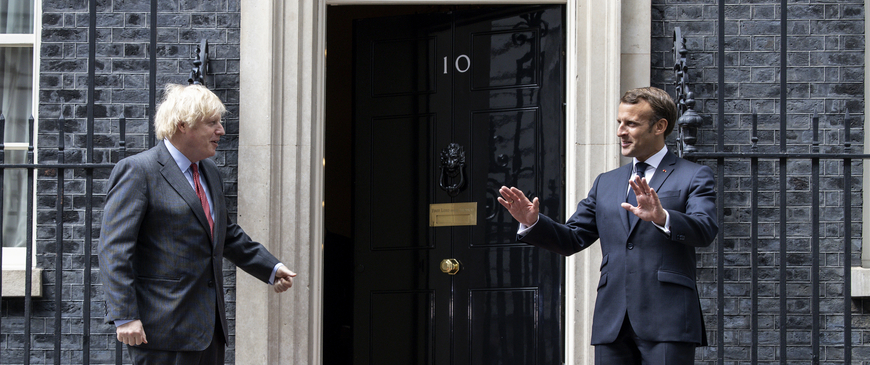
Franco-British relations shouldn’t be a circus
Relations between the UK and France are a mess. Boris Johnson has told Emmanuel Macron in cod French to “Prenez un grip”. Macron has (allegedly) called Johnson “a clown”. British Cabinet Minister Jacob Rees-Mogg suggested that the French were still upset about Agincourt and Trafalgar; former French Ambassador in London Sylvie Bermann said relations hadn’t been this bad since Waterloo. In recent months the two have argued about fishing rights, submarine sales to Australia, cross-Channel migration and Brexit. No doubt they’ll find more things to argue about, given time.
Politicians on both sides need to stop this nonsense. If they insist on using historical analogies, they should recall the blood the two countries’ armies shed together in two world wars. The threats to Europe’s security may not be as acute as they were in 1914 or 1939, but they are serious, manifold and growing. Europe’s two most important diplomatic and military powers must focus on the strategic interests they have in common, particularly in the defence arena.
On the face of it, Britain and France should be a natural fit as partners in defence. Between them, they account for more than 40 per cent of defence spending by European members of NATO – though their combined defence budgets still only amount to about one-sixth of America’s.
They are the only European armed forces able to conduct high-intensity operations in distant theatres with limited US or other allied assistance. The Combined Joint Expeditionary Force (CJEF), fully operational since 2020, allows London and Paris to deploy a joint land, air and naval force of up to 10,000 personnel rapidly.
Franco-British defence industrial co-operation presents a more mixed picture. In 2020 British and French defence ministers announced a contract to produce a common autonomous maritime mine countermeasures system – intended to replace the existing mine countermeasures vessels of the two sides. The European missile company MBDA is working on a number of joint missile projects for UK and French forces, replacing previous national systems. But the UK and France are backing rival multinational projects for next-generation combat aircraft.
The main divergence between London and Paris is over the roles of the EU and NATO in European security. The UK’s post-Brexit absence from EU discussions has widened the gap. France has taken Brexit as an opportunity to promote Macron’s ideas for European strategic autonomy.
As the US focuses increasingly on countering China’s rise, Europe is right to take more responsibility for maintaining its own security. President Joe Biden acknowledged that in a joint statement with Macron in September, which recognised “the importance of a stronger and more capable European defence, that contributes positively to transatlantic and global security and is complementary to NATO”. France has emphasised the European aspect, however, and downplayed the issue of complementarity. Macron, who in 2019 described NATO as “brain dead”, has moderated his language, but does not seem enthusiastic about revitalising NATO.
The UK has the opposite problem: it refuses to accept that the EU plays a significant role in European security and is becoming a defence actor in its own right. The British government’s ‘Integrated review of security, defence, development and foreign policy’, published in March 2021, has almost nothing to say on the potential contribution of the EU to European defence and security.
Both France and the UK need to escape their ideological illusions. Macron needs to admit that NATO will do some things better than the EU for the foreseeable future, and accept that many EU member-states (especially those in Central Europe and the Nordic/Baltic region) want NATO to do more, not less. Johnson should stop pretending that the EU’s institutions cannot add any value to what individual member-states or NATO are doing in the defence and security field. As a sign of his good intentions, he should join Canada, Norway and the US in participating in a much-needed EU project, supported by NATO, to facilitate the movement of military forces around Europe.
Johnson has apparently spoken of forging a new strategic alliance with France. For that to be a realistic ambition, both leaders need to rebuild mutual trust and put aside the short-term political incentives to fuel bilateral tensions. Johnson’s popularity with his pro-Brexit supporters benefits from picking fights with France; Macron’s electoral chances against eurosceptic rivals improve if Brexit is seen to harm the UK. But Russian forces are once again threatening Ukraine, Belarus is weaponising migrants on its borders with the EU, Bosnia is threatening to fall apart and conflicts in Africa are multiplying. Cross-Channel bickering is a luxury that neither London nor Paris can afford.
Ian Bond is director of foreign policy at the Centre for European Reform.
